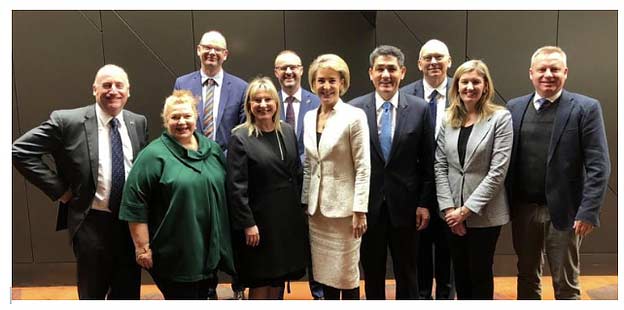India is reforming education for the first time since 1986 – here’s why Australia should care
India released a Draft National Education Policy (DNEP) in June 2019. It’s the first comprehensive policy proposal on education in the country since 1986 and a major, game-changing statement.
Australia has a moral duty to engage with the global challenge of providing quality education to hundreds of millions of Indian youth. And by engaging with India as it rolls out this policy, Australian universities stand to gain knowledge and research capacity, among many other things.
For more Information, please refer to;
https://theconversation.com/india-is-reforming-education-for-the-first-time-since-1986-heres-why-australia-should-care-121812
ACCC wins record $26m penalty against bankrupt education provider Empower
The Federal Court has handed a record $26.5 million fine to failed training college Empower Institute, as well as a demand it repays more than $56 million to the Commonwealth Government for funding it received to run courses.
However, the fine may prove academic, given the firm put itself into liquidation once the Australian Competition and Consumer Commission (ACCC) started action against it in late 2017.
It is understood the fine is unlikely to ever be paid, but lawyers are trawling through the wreckage to see how much the Commonwealth will be able to retrieve.
For more Information, please refer to https://www.abc.net.au/news/2019-09-20/accc-wins-record-26-million-penalty-from-bankrupt-training-body/11533080
Victoria’s TAFE course completion rate the worst in Australia
At least two out of three people who enrolled in a government-funded TAFE course in Victoria between 2015 and 2017 quit before gaining a qualification.
The dismal completion rate has come to light in new figures produced by the National Centre for Vocational Education Research, which demonstrate that Victoria had the lowest course completion rate for government-funded vocational education in the country in 2017, with just 29.6 per cent of students gaining a qualification.
For more Information, please refer to https://www.theage.com.au/national/victoria/victoria-s-tafe-course-completion-rate-the-worst-in-australia-20190829-p52m5l.html
ATARs could be scrapped as education needs expand
The ATAR system appears destined for the scrapheap owing to the narrowness of what it tells employers and educators about the ability of a student.
The chair of the government’s new Review of Senior Secondary Pathways, professor Peter Shergold told The Australian Financial Review Australia focuses “far too strongly on a single measure of achievement” when getting a job or doing further education is dependent on many characteristics, including non-academic ones.
The chancellor of Western Sydney University said the shortcomings of the Australian Tertiary Admission Rank fed into a distorted array of options for what to do after leaving school, which pushed year 12 students into choices they weren’t equipped to make.
For more Information, please refer to https://www.afr.com/policy/health-and-education/atars-could-be-scrapped-as-education-needs-expand-20190920-p52tfz
Australia needs a national shipbuilding authority
The latest salvo in the national debate about how best to spread the risks and benefits of the $300-billion naval shipbuilding plan is whether full-cycle docking of the Collins-class submarines should move from South Australia to Western Australia. It’s an important decision.
The Collins fleet is based in Perth. Although the boats were built by ASC in Adelaide, their ongoing sustainment involves four-yearly mid-cycle dockings that take place at HMAS Stirling and the Henderson shipyard in Western Australia. ASC has a total workforce of around 2,200 with around 280 positions in WA to do routine and mid-cycle sustainment work.
Major full-cycle dockings are required every eight to 10 years. They take two years to complete and can involve cutting open the submarine for a ground–up ‘nuts and bolts’ rebuild of hardware and systems. They are currently returned to the manufacturer, ASC at its Adelaide shipyard, where a highly skilled workforce reinvents each submarine.
For more Information, please refer to https://www.aspistrategist.org.au/australia-needs-a-national-shipbuilding-authority/
Caleb Bond: It’s simple — without more tradies, Australia’s in trouble
The number of new apprentices in Australia is at its lowest point in two decades and vocational training in turmoil. Without trades, we’re in trouble – and it’s nothing short of a national crisis, writes Caleb Bond.
If we don’t train children to take the jobs that need filling, we will have failed them at the most basic level.
The continued ignorance towards trades as an important part of our nation’s future, and the effect that has on us all, is nothing short of a national crisis.
The education system exists to turn children into well-adjusted, contributing members of society.
But we continually fail them by pushing them in the direction of studies that will do nothing to help them get a job.
In a recent development, high school students are now being told to do vocational training that doesn’t interest them just to tick a box.
Business SA reckons less than 5 percent of students doing vocational courses are actually interested in taking their field of study up as a job or an apprenticeship, which means we’re in real trouble.
These students, apparently, are being steered in the direction of these courses so they can be passed off as achieving a “satisfactory level of schooling”.
In other words, they’re going through the motions to get the whole thing over with as little fuss as possible.
Which is all well and good when you’re 16 and desperate to get out of school.
For more Information, please refer to https://www.adelaidenow.com.au/news/opinion/caleb-bond-its-simple-without-more-tradies-australias-in-trouble/news-story/078013ac438e9e91784d060ffe44df25
Australia lands 8th in the WorldSkills competition
Australia’s trainees and apprentices took their skills to the world’s best this August at the WorldSkills Competition.
Placing eighth overall, the team of 15 made up one of 66 national teams that competed in the Russian city of Kazan.
The competition, which showcases the benefits of skilled trade professionals and vocational institutions, ranked contestants with a bronze, silver, or gold medal.
Clinton Larkings came away with a silver medal in the Industrial Mechanics (Millwright) category, which tested the TAFE NSW Orange student’s ability to install, maintain, repair, and remove machinery and equipment.
Anthony Ters, of TAFE NSW Mount Druitt, received the Medallion of Excellence in Automobile technology.
Bronze medals were also worn by Patrick Brennan, for refrigeration & air-conditioning, and Patrick Keating for plumbing and heating.
For more Information, please refer to https://www.manmonthly.com.au/Australia+lands+8th+in+the+WorldSkills+competition
A VET reform every two and a half weeks
Governments have made 465 reforms to the training sector in the last 21 years, an average of one every two and a half weeks for more than two decades which has left the sector reeling from reform fatigue and students and teachers “unable to make long term plans”
For more Information, please refer to https://www.afr.com/policy/health-and-education/a-vet-reform-every-two-and-a-half-weeks-20190908-p52p42




































